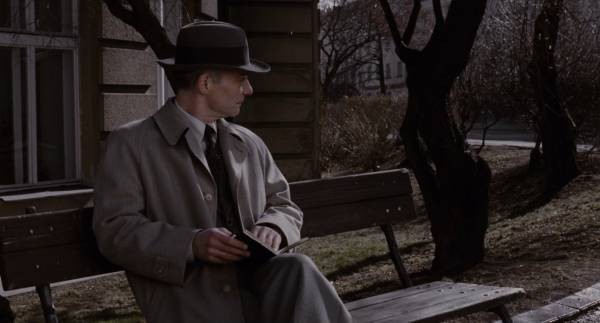 IVAN TROJAN IN IN THE SHADOWToiling against communist machine bigotry in Fifties Prague
IVAN TROJAN IN IN THE SHADOWToiling against communist machine bigotry in Fifties PragueSeven years ago at the San Francisco film festival I watched David Ondrícek's light, surreal
Grandhotel. Why did he turn to dark noirish stuff, as he's done with the aptly named
In the Shadow? The opening scenes are so dark you can hardly make out anything, and some of the later ones are too. Apparently he felt a compelling need to comment, as others in recent years have done, on the dark evils of the Soviet era. But that is the trouble; others have done it, and sometimes better, as a reminder of which, this film even has an actor from von Donnersmarck's impressive
The Lives of Others in a lead role.
In the Shadow is very well done, particularly in its atmosphere and images. The grayish but richly sepia-hued images are beautiful. The street scenes have a rickety authenticity. The old cars are sublime, the raincoat-and-fedora cast are all pros. But the characters are somewhat underdeveloped, their private lives sketchy, the scenes a tad too grim and inconclusive to offer any pleasure or intellectual reward. Perhaps you had to be there, of need to be living closer to the aftermath of these times, to feel fully engaged. The lightness and originality of
Grandhotel is missing. And it didn't need to be: other films about the Soviet era have been surreal.
The focus is on 1953 Prague's currency devaluation, which wiped out people's savings, and the brutal show trials, specifically the anti-Semitic ones (the chronology is rearranged a bit). Everything is seen from the noncommittal, dogged viewpoint of an honest cop, Capt. Jarda Hakl, played by the stern-faced Ivan Trojan. The film begins with an investigation led at first by Hakl of what seems a routine jewelry theft from a safe. It's immediately pinned on an alcoholic Jewish crook (who has a valid alibi) associated with the Jewish Community Center. The profits of the theft are supposedly part of a secret fund to support Israeli's "Zionist terrorists and US aggressors," and five Jewish immigrants are arrested and made to plead guilty of this "plot." All this is fabricated, as Hakl quickly grasps.
The Soviets have sent in a German ex-SS man, Zenke (Sebastian Koch, the
Lives of Others actor) to go over the heads of the local police to push through the railroading of Jews to show trials. The local man, Hakl, gradually seeking the aid of Zenke, who did eight years in Siberia and is a captive here, determines to fight this fakery, at no little cost to his and his family's safety. The possible alliance between Hakl and Zenke is a ray of hope in the darkness. But Zenke needs to cooperate to be swapped and rejoin his family, and Hakl is blocked by his soon-to-be promoted superior, , Panek (Jiri Stepnicka).
Hakl's relations with his wife (Sona Norisova) are shaky, Maaybe work tensions kill his sex drive. In an ambiguous ritual gesture, he breaks off part of cigarettes he smokes before lighting them. "He only smokes the healthy part," a colleague quips. Or is it a symbolic self-emasculation? At home the saving grace is how well he gets on with his lively young son Tom (Filip Antonio), to whom he reads Jules Verne's
20,000 Leagues Under the Sea at night. He tells Tom hes' fighting a giant squid just like in the book. The book says the squid cannot be defeated, but he says if you fight it persistently it will grow weak. The story line, like the images, is dark. The purpose is mainly to use the noirish situation of an honest man fighting a losing battle against corruption as a way of depicting the Fifties communist show trials and commemorate their many victims. Both come off as somewhat artificial; only the dark atmosphere is real.
Ondricek's
Grandhotel was too whimsical, a bit incomprehensible at times. But it was memorable.
In the Shadow, for all its skill and mood, has to compete with other equally good or better treatments of the Soviet era. Maybe the director will get off his soapbox next time and achieve a more personal synthesis.
Variety's Eddie Cockrell says, "tech package is pro," starting with dp Adam Sikora's subtle colors, and continuing with Jan P. Muchow and Michal Novinski's Forties or Fifties style score, whose excitement has a film noir flavor too. Script by Marek Epstein, David Ondrícek, and Misha Votruba.
In the Shadow//Ve stínu, in Czech and German, 106 mins., was the 2012 Best Foreign Czech Oscar entry. Released theatrically in the Czech Republic, Poland, and Israel, it has shown in various festivals. Screened for this review as part of the San Francisco Jewish Film Festival, July 25-Aug. 12, 2013.





